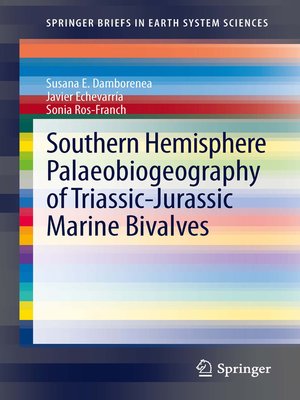Southern Hemisphere Palaeobiogeography of Triassic-Jurassic Marine Bivalves
ebook ∣ SpringerBriefs in Earth System Sciences
By Susana E. Damborenea

Sign up to save your library
With an OverDrive account, you can save your favorite libraries for at-a-glance information about availability. Find out more about OverDrive accounts.
Find this title in Libby, the library reading app by OverDrive.



Search for a digital library with this title
Title found at these libraries:
| Library Name | Distance |
|---|---|
| Loading... |
Palaeobiogeography is a complex subject which processes information provided by both Biology and Earth Sciences. It is conceptually and philosophically equivalent to neobiogeography. Nevertheless, its methods are somewhat different, since it is limited by the incompleteness of the fossil record. On the other hand, it has direct access to the time dimension, a key ingredient of organic evolution. Mesozoic benthonic mollusks, and especially bivalves, have a great potential for palaeobiogeographical analysis due to their commonly good preservation, abundance, diversity and high dispersion potential at the larval stage. From a merely descriptive point of view, the analysis of their distribution shows latitudinal gradients and distributional patterns, both at regional and global scales, which are the basis for the recognition of biochoremas or palaeobiogeographical units of different ranks. Moving forward towards a causal
palaeobiogeography, these organisms also provide interesting insight into particular biogeographical questions, such as bipolarity and its origin. The evolution in time of the
recognized biochoremas can be discussed in relation to palaeoclimas and extinction events. Finally, some of the results obtained from the analysis of the distribution of past
bivalve biotas were even used to propose and discuss the development of marine corridors and argue about the distribution of continents in the past.
palaeobiogeography, these organisms also provide interesting insight into particular biogeographical questions, such as bipolarity and its origin. The evolution in time of the
recognized biochoremas can be discussed in relation to palaeoclimas and extinction events. Finally, some of the results obtained from the analysis of the distribution of past
bivalve biotas were even used to propose and discuss the development of marine corridors and argue about the distribution of continents in the past.







